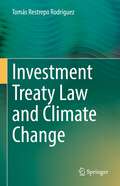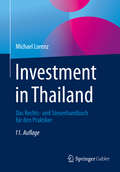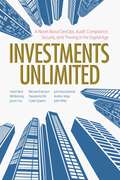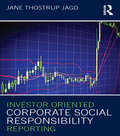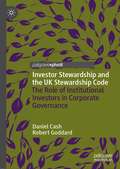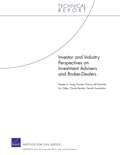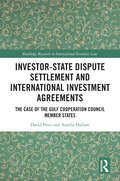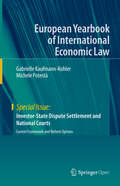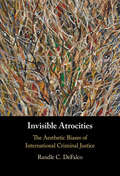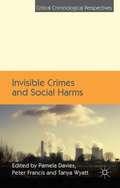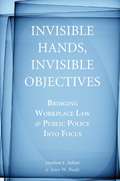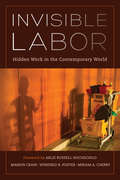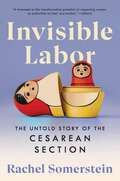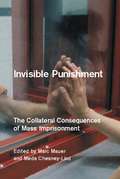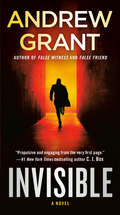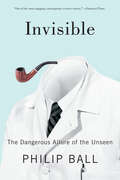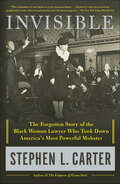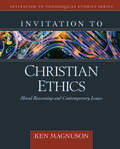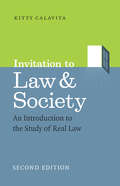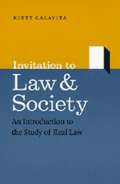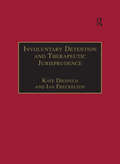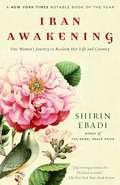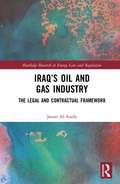- Table View
- List View
Investment Treaty Law and Climate Change
by Tomás Restrepo RodríguezThe book deals with the question whether the investment treaty law system could be harmonized with the climate change international legal framework and the climate interest that lies beyond. The answer to this research question is divided into three parts. The first examines the relevance of the climate change international legal framework in investment treaty disputes as a natural pre(logical)interpretative stage. The second focuses on the BIT’s content-interpretation, which is the orthodox approach to solve the fragmentation between the system of investment treaty law and the system of international climate change law. Finally, the third part tackles this fragmentation through a heterodox approach that is grounded in the direct application of climate change principles through law ascertainment. Apart from concluding that harmonization between investment treaty law and international climate change law is possible through the orthodox approach to the expropriation and the FET standards, as well as through the direct application of the climate change precautionary principle and the CBDRRC principle − heterodox approach, the book suggests that tribunals are expected soon to openly address climate change disputes in their rulings.
Investment in China's Health and Care Sector: Opportunities and Possibilities for Foreign Investors
by Björn EtgenThis reference book provides promising strategies for investing in the promising healthcare and nursing sector of the People's Republic of China. The Chinese healthcare sector is growing steadily, and the Chinese government has recognized that the participation of foreign investors is essential to improve and develop the Chinese healthcare system, especially in metropolitan areas. This opens up opportunities and possibilities for foreign healthcare providers, whose investments are increasingly welcomed and supported by the Chinese government. The book presents ways to make safe and profitable investments in the Chinese healthcare market: from the construction of new hospitals and nursing homes to the introduction of the necessary medical equipment and the acquisition and recruitment of qualified staff. In particular, the legal framework conditions are highlighted.This book is a translation of the original German 1st edition Investitionen im chinesischen Gesundheits- und Pflegesektor by Björn Etgen, published by Springer Fachmedien Wiesbaden GmbH, part of Springer Nature in 2019. The translation was done with the help of artificial intelligence (machine translation by the service DeepL.com). A subsequent human revision was done primarily in terms of content, so that the book will read stylistically differently from a conventional translation. Springer Nature works continuously to further the development of tools for the production of books and on the related technologies to support the authors.
Investment in Thailand: Das Rechts- und Steuerhandbuch für den Praktiker
by Michael LorenzDieses Buch bietet Praktikern einen essenziellen Überblick über das aktuelle thailändische Wirtschaftsrecht. Thailand gehört heute zu den wirtschaftlich attraktivsten Hubs in Südostasien und wirbt als etablierter Wirtschaftsstandort erfolgreich um Auslandsinvestitionen – mit guten Voraussetzungen für europäische Investoren.Rechtsanwalt Michael Lorenz erläutert anschaulich alle wesentlichen thailändischen Regularien, um Unternehmen, Organisationen, Investoren, Juristen und interessierten Laien rasche Orientierung bei der Klärung grundlegender rechtlicher, steuerlicher und wirtschaftlicher Fragen zu bieten. Die 11. Auflage wurde vollständig überarbeitet und auf den aktuellen Rechtsstand Januar 2019 gebracht.Darüber hinaus gibt das Werk dem Leser weiterführende Informationen an die Hand, die für westliche Investoren relevant sind, und beleuchtet interkulturelle Gegebenheiten des Wirtschaftslebens. Zahlreiche Beispiele illustrieren die Bedeutung für die Praxis.
Investments Unlimited: A Novel About DevOps, Security, Audit Compliance, and Thriving in the Digital Age
by Jason Cox John Willis Helen Beal Bill Bensing Michael Edenzon Topo Pal Caleb Queern John Rzezotarski Andres VegaSusan Jones had been the CEO of Investments Unlimited, Inc. (IUI) for five years, a financial institution that has successfully navigated their digital transformation. She is quick on her feet and is trusted by the board. But right now—although you can't tell from her demeanor—she was panicking. Today, IUI received notice from bank regulators concerning their unsatisfactory audit and compliance practices. If they failed to address the regulators' concerns within the year, the company could go up in smoke. She didn't understand. How had her team let this happen? How had she let this happen? Over the past several years, IUI had executed a digital transformation strategy following the business accelerating principles of Agile and DevOps. By any metric they had seemingly done things right. Feedback from customers was astounding and conversion rates for new accounts was growing faster than ever. But along the way IUIs manual governance process had become inundated with friction, frustration, and failure for the teams attempting to deliver value for their organizations. Now, it's all hands on deck for a cross-functional team of executives and engineers to develop a modern automated governance process that satisfies regulators without slowing the company's ability to meet customer demands and compete in the market.In the vein of bestselling titles The Phoenix Project and The Unicorn Project, Investments Unlimited helps organizations radically rethink how they handle audit, compliance, and security for their software systems. By introducing concepts, tools, and ideas to reimagine governance, this book catalyzes a more humane way to enable high-velocity software delivery that inspires trust and is inherently more secure.
Investor Oriented Corporate Social Responsibility Reporting
by Jane Thostrup JagdReporting organizations' corporate social responsibility activities is difficult - a lack of regulation means that the communication of these activities varies significantly and there is a multitude of ways in which mistakes can be made. The author provides the tools and insights required to produce investor-friendly CSR reports and includes a chapter showing how the investors can integrate CSR in their quantified analysis of investment-opportunities. Features include formulas, conversion standards and CSR note tables which enable the book to be used as a practical handbook as well as in the classroom. Written by an experienced compliance officer with years of experience in reporting CSR, this book is an easy-to-follow guide for practitioners and students and will be required reading for students of accounting, financial reporting and auditing as well as those in industry who want to improve their organization's reporting standards.
Investor Stewardship and the UK Stewardship Code: The Role of Institutional Investors in Corporate Governance
by Robert Goddard Daniel CashThis book provides a critical assessment of the development of the Stewardship Code 2020, which sets out principles regarding the role of institutional investors in corporate governance. It discusses how the regulatory framework for stewardship evolved before and after the financial crisis, and how that evolution resulted in the 2020 Code. It then critiques the Code from a practical and academic perspective, as well as evaluating the wider regulatory framework; in particular, the position of the FRC (ARGA). The book concludes by offering insight into different pathways that the evolution of stewardship may continue to take. Stewardship Codes modelled on the U.K.’s original 2010 version have been introduced in numerous markets and as such the book will be relevant for an international audience of academics, regulators and policymakers in financial regulation, investment regulation and financial services.
Investor and Industry Perspectives on Investment Advisers and Broker-Dealers
by Claude Berrebi Noreen Clancy Eric Talley Angela A. Hung Jeff DominitzIn theory, financial professionals are relatively distinct: A broker-dealer conducts transactions in securities on behalf of itself and others; and an investment adviser provides advice to others regarding securities. Different laws regulate each type of professional, but boundaries have blurred. This report examines current business practices and investor understanding of each type.
Investor-State Dispute Settlement and International Investment Agreements: The Case of the Gulf Cooperation Council Member States (Routledge Research in International Economic Law)
by David Price Amelia HallamThis book examines the international investment agreements and the dispute settlement mechanisms contained therein, which bind the Gulf Cooperation Council member States.The Gulf Cooperation Council (GCC), comprising Bahrain, Kuwait, Oman, Qatar, Saudi Arabia, and the United Arab Emirates, is complex and unique. Recently, all member States have experienced increasing investor–state arbitration claims, while their nationals are increasingly instituting investor–state arbitrations to protect their own foreign investments. Intra-GCC disputes, though relatively rare, have also appeared, largely as a result of the recent Gulf crisis. While focussing particularly upon the investor–state dispute settlement experience of member States as respondents, the book also explores the experiences of their nationals as claimants to determine how they can approach investor– state dispute settlement in the future. The book also reflects on existing treaty-making practices, making recommendations for regional-level dispute settlement to improve upon investor–state dispute settlement outcomes.This book provides a detailed analysis of the global investor–state dispute settlement regime and international investment agreements, and it will be of interest to students, academics, and practitioners with an interest in international investment law and arbitration.
Investor-State Dispute Settlement and National Courts: Current Framework and Reform Options (European Yearbook of International Economic Law)
by Gabrielle Kaufmann-Kohler Michele PotestàThis open access book examines the multiple intersections between national and international courts in the field of investment protection, and suggests possible modes for regulating future jurisdictional interactions between domestic courts and international tribunals. The current system of foreign investment protection consists of more than 3,000 international investment agreements (IIAs), most of which provide for investment arbitration as the forum for the resolution of disputes between foreign investors and host States. However, national courts also have jurisdiction over certain matters involving cross-border investments. International investment tribunals and national courts thus interact in a number of ways, which range from harmonious co-existence to reinforcing complementation, reciprocal supervision and, occasionally, competition and discord. The book maps this complex relationship between dispute settlement bodies in the current investment treaty context and assesses the potential role of domestic courts in future treaty frameworks that could emerge from the States’ current efforts to reform the system.The book concludes that, in certain areas of interaction between domestic courts and international investment tribunals, the “division of labor” between the two bodies is not always optimal, producing inefficiencies that burden the system as a whole. In these areas, there is a need for improvement by introducing a more fruitful allocation of tasks between domestic and international courts and tribunals – whatever form(s) the international mechanism for the settlement of investment disputes may take.Given its scope, the book contributes not only to legal analysis, but also to the policy reflections that are needed for ongoing efforts to reform investor-State dispute settlement.
Invisible Atrocities: The Aesthetic Biases of International Criminal Justice
by Randle C. DeFalcoInternational criminal justice is, at its core, an anti-atrocity project. Yet just what an 'atrocity' is remains undefined and undertheorized. This book examines how associations between atrocity commission and the production of horrific spectacles shape the processes through which international crimes are identified and conceptualized, leading to the foregrounding of certain forms of mass violence and the backgrounding or complete invisibilization of others. In doing so, it identifies various, seemingly banal ways through which international crimes may be committed and demonstrates how the criminality of such forms of violence and abuse tends to be obfuscated. This book suggests that the failure to address these 'invisible atrocities' represents a major flaw in the current international criminal justice system, one that produces a host of problematic repercussions and undermines the legal legitimacy of international criminal law itself.
Invisible Crimes and Social Harms
by Pamela Davies Peter Francis Tanya WyattThis unique collection explores the continuing invisibility of much crime and victimization, and the lack of adequate responses to them. Shaping the lens through which criminology and victimology is approached in the twenty-first century, the volume examines major issues including (in)justice, risks, rights, regulation and enforcement.
Invisible Hands, Invisible Objectives: Bringing Workplace Law and Public Policy into Focus
by Stephen F. Befort John W. BuddWritten for policymakers and scholars, this volume shows how the current global financial crisis affects free market ideologies, and how employment relationships in the United Sates need to be reworked in terms of regulations and economic efficiency. Befort (law, U. of Minnesota Law School) and Budd (management, U. of Minnesota) introduce a set of reforms that address regulatory enforcement, employee benefits, living wages, workplace safety and health, balanced income distributions and labor unions. The authors also emphasize the need for explicitness in all aspects of workplace law and public policy. Annotation ©2009 Book News, Inc. , Portland, OR (booknews. com)
Invisible Labor: Hidden Work in the Contemporary World
by Marion Crain Miriam Cherry Winifred PosterAcross the world, workers labor without pay for the benefit of profitable businesses--and it's legal. Labor trends like outsourcing and technology hide some workers, and branding and employer mandates erase others. Invisible workers who remain under-protected by wage laws include retail workers who function as walking billboards and take payment in clothing discounts or prestige; waitstaff at "breastaurants" who conform their bodies to a business model; and inventory stockers at grocery stores who go hungry to complete their shifts. Invisible Labor gathers essays by prominent sociologists and legal scholars to illuminate how and why such labor has been hidden from view.
Invisible Labor: The Untold Story of the Cesarean Section
by Rachel SomersteinAn incisive yet personal look at the science and history of the most common surgery performed in America—the cesarean section—and an exposé on the disturbing state of maternal medical careWhen Rachel Somerstein had an unplanned C-section with her first child, the experience was anything but “routine.” A series of errors by her clinicians led to a real-life nightmare: surgery without anesthesia. The ensuing mental and physical complications left her traumatized and searching for answers about how things could have gone so wrong.In the United States, one in three babies is born via C-section, a rate that has grown exponentially over the past fifty years. And while in most cases the procedure is safe, it is not without significant, sometimes life-changing consequences, many of which affect people of color disproportionately. With C-sections all but invisible in popular culture and pregnancy guides, new mothers are often left to navigate these obstacles on their own.Somerstein weaves personal narrative and investigative journalism with medical, social, and cultural history to reveal the operation’s surprising evolution, from its early practice on enslaved women to its excessive promotion by modern medical practitioners. She uncovers the current-day failures of the medical system, showing how pregnant women's agency is regularly disregarded by providers who, motivated by fear of litigation or a hospital’s commitment to efficiency, make far-reaching and deeply personal decisions on behalf of their patients. She also examines what prevailing maternal and medical attitudes toward C-sections tell us about American culture.Invisible Labor lifts the veil on C-sections so that people can make choices about pregnancy and surgical birth with greater knowledge of the risks, benefits, and alternatives, with information on topics including:VBAC (vaginal birth after cesarean) and repeat c-sectionPain and pain management during childbirthHow C-sections can affect family planningThe valuable role of midwives and doulas in the birth experienceThe myths behind “natural” childbirth How limitations put on reproductive rights impact pregnant peopleWith deep feeling and authority, Somerstein offers support to others who have had difficult or traumatic birth experiences, as well as hope for new forms of reproductive justice.
Invisible Punishment
by Marc Mauer Meda Chesney-LindIn a series of newly commissioned essays from the leading scholars and advocates in criminal justice, Invisible Punishment explores, for the first time, the far-reaching consequences of our current criminal justice policies. Adopted as part of "get tough on crime" attitudes that prevailed in the 1980s and '90s, a range of strategies, from "three strikes" and "a war on drugs," to mandatory sentencing and prison privatization, have resulted in the mass incarceration of American citizens, and have had enormous effects not just on wrong-doers, but on their families and the communities they come from. This book looks at the consequences of these policies twenty years later.
Invisible: A Novel (Paul McGrath #1)
by Andrew GrantAn Army veteran and intelligence agent goes undercover as a janitor at a federal courthouse to pursue his own brand of justice in a thriller that’s part John Grisham, part Robert Crais.“Propulsive and engaging from the very first page.”—C. J. Box, #1 New York Times bestselling author of the Joe Pickett series As a young man, Paul McGrath rebelled against his pacifist father by becoming a standout Army recruit and the star of his military intelligence unit. But lingering regrets about their relationship make him return home, only to find his father dead, seemingly murdered. When the case ends in a mistrial—after a key piece of evidence disappears—something doesn’t smell right to McGrath. So he puts his arsenal of skills to work to find out just how corrupt the legal system is. And to keep digging, he gets a job at the courthouse. But not as a lawyer or a clerk. . . . Now McGrath is a janitor. The perfect cover, it gives him security clearance and access to the entire building. No one notices him, but he notices everyone. He notices when witnesses suddenly change their stories. When jury members reverse their votes during deliberation. When armies of corporate attorneys grind down their small-time adversaries with endless tactical shenanigans. While McGrath knows that nothing he discovers can undo his past wrongs or save his father, he finds his new calling brings him something else: the chance to right current wrongs and save others. And by doing so—just maybe—to redeem himself . . . if the powerful and corrupt don’t kill him first.Advance praise for Invisible “The masterful Andrew Grant outdoes himself with this deliciously twisty, magnetic thriller. Fiercely redemptive, with its clever, profoundly moving, and altogether captivating David and Goliath hook, Invisible is a winner.”—Sara Blaedel, #1 internationally bestselling author of The Forgotten Girls“Paul McGrath is not just a janitor—he’s a terrific new hero in what promises to be a fantastic and original series by Grant. Paul may be invisible . . . but his results are not in this intense mystery thriller that will leave you wanting more. In a word? Awesome.”—Allison Brennan, New York Times bestselling author of Too Far Gone“Invisible is a riveting read from cover to cover. I love getting in on the ground floor of a new series, especially when it’s sure to be a hit!”—John Gilstrap, New York Times bestselling author of the Jonathan Grave series
Invisible: The Dangerous Allure of the Unseen
by Philip Ball“A very fun, largely chronological journey through invisibility, beginning with myth and early magicians, ending with quantum physics.” —The New YorkerIn this lively look at a timeless idea, Ball provides the first comprehensive history of our fascination with the unseen. This sweeping narrative moves from medieval spell books to the latest nanotechnology, from fairy tales to telecommunications, from camouflage to ghosts to the dawn of nuclear physics and the discovery of dark energy. Along the way, Invisible tells little-known stories about medieval priests who blamed their misdeeds on spirits; the Cock Lane ghost, which intrigued both Samuel Johnson and Charles Dickens; the attempts by Victorian scientist William Crookes to detect forces using tiny windmills; novelist Edward Bulwer-Lytton’s belief that he was unseen when in his dressing gown; and military efforts to enlist magicians to hide tanks and ships during WWII. Bringing in such voices as Plato and Shakespeare, Ball provides not only a scientific history but a cultural one—showing how our simultaneous desire for and suspicion of the invisible has fueled invention and the imagination for centuries.In this unusual and clever book, Ball shows that our fantasies about being unseen—and seeing the unseen—reveal surprising truths about who we are.“Full of insights drawn from a broad survey of history, literature and philosophy; wherever the invisible is being contemplated, Ball is there to select the juiciest anecdotes . . . [He] is a lucid, witty and highly entertaining guide.” —The Globe and Mail“A tour-de-force history capped off with an animated discussion of H.G. Wells’s novel The Invisible Man.” —Publishers Weekly (starred review)
Invisible: The Forgotten Story of the Black Woman Lawyer Who Took Down America's Most Powerful Mobster
by Stephen L. CarterThe bestselling author delves into his past and discovers the inspiring story of his grandmother’s extraordinary life She was black and a woman and a prosecutor, a graduate of Smith College and the granddaughter of slaves, as dazzlingly unlikely a combination as one could imagine in New York of the 1930s—and without the strategy she devised, Lucky Luciano, the most powerful Mafia boss in history, would never have been convicted. When special prosecutor Thomas E. Dewey selected twenty lawyers to help him clean up the city’s underworld, she was the only member of his team who was not a white male.Eunice Hunton Carter, Stephen Carter’s grandmother, was raised in a world of stultifying expectations about race and gender, yet by the 1940s, her professional and political successes had made her one of the most famous black women in America. But her triumphs were shadowed by prejudice and tragedy. Greatly complicating her rise was her difficult relationship with her younger brother, Alphaeus, an avowed Communist who—together with his friend Dashiell Hammett—would go to prison during the McCarthy era. Yet she remained unbowed.Moving, haunting, and as fast-paced as a novel, Invisible tells the true story of a woman who often found her path blocked by the social and political expectations of her time. But Eunice Carter never accepted defeat, and thanks to her grandson’s remarkable book, her long forgotten story is once again visible.
Invitation to Christian Ethics: Moral Reasoning And Contemporary Issues (Invitation to Theological Studies)
by Ken MagnusonA comprehensive introduction to Christian ethics addressing today’s most challenging moral issuesInvitation to Christian Ethics is an indispensable guide for helping pastors, counselors, and everyday Christians navigate today’s difficult moral questions. Readers will benefit from Ken Magnuson’s survey of ethics from a biblical perspective as well as contemporary theories of moral reasoning. This survey is followed by twelve chapters devoted to some of the thorniest issues Christians encounter today, such as: • Sexuality, including homosexuality, sexual identity, and gender• Marriage and divorce• Infertility and assisted reproductive technologies• Abortion• Physician-assisted suicide• Race relations• Creation care• Capital punishment• Just war, pacifism, and the use of lethal forceMagnuson provides biblical insight into each topic and presents key moral considerations. He also answers specific, practical questions that arise and concludes with a summary of his recommended approach to each issue. Readers will learn how to grapple with difficult moral questions and will receive guidance for some of life’s most challenging ethical conundrums.
Invitation to Law and Society, Second Edition: An Introduction to the Study of Real Law (Chicago Series in Law and Society)
by Kitty CalavitaLaw and society is a rapidly growing field that turns the conventional view of law as mythical abstraction on its head. Kitty Calavita brilliantly brings to life the ways in which law is found not only in statutes and courtrooms but in our institutions and interactions, while inviting readers into conversations that introduce the field's dominant themes and most lively disagreements. Deftly interweaving scholarship with familiar examples, Calavita shows how scholars in the discipline are collectively engaged in a subversive exposé of law's public mythology. While surveying prominent issues and distinctive approaches to both law as it is written and actual legal practices, as well as the law's potential as a tool for social change, this volume provides a view of law that is more real but just as compelling as its mythic counterpart. With this second edition of Invitation to Law and Society, Calavita brings up to date what is arguably the leading introduction to this exciting, evolving field of inquiry and adds a new chapter on the growing law and cultural studies movement.
Invitation to Law and Society: An Introduction to the Study of Real Law
by Kitty CalavitaLaw and Society is a rapidly-growing interdisciplinary field that turns on its head the conventional, idealized view of the "Law" as a magisterial abstraction. Kitty Calavita's Invitation to Law and Society brilliantly brings to life the ways in which law shapes and manifests itself in the institutions and interactions of human society, while inviting the reader into conversations that introduce the field's dominant themes and most lively disagreements.Deftly interweaving scholarship with familiar personal examples, Calavita shows how scholars in the discipline are collectively engaged in a subversive exposé of law's public mythology. While surveying prominent issues and distinctive approaches to the use of the law in everyday life, as well as its potential as a tool for social change, this volume provides a view of law that is more real but just as compelling as its mythic counterpart. In a field of inquiry that has long lacked a sophisticated yet accessible introduction to its ways of thinking,Invitation to Law and Society will serve as an engaging and indispensable guide.
Involuntary Detention and Therapeutic Jurisprudence: International Perspectives on Civil Commitment
by Kate DiesfeldInternational developments within the last twenty years have demonstrated controversial shifts in treatment for people with mental illnesses and the care of persons with intellectual disabilities. These shifts have been apparent in an emphasis on deinstitutionalization, increased scrutiny of detention and discharge decisions and, in some countries, in enforced treatment and care in the community. As we become increasingly conscious of the political and moral dimensions of civil commitment, these concerns are reflected in the professional literature, but this does not often enough focus on issues of clinical and legal principle, nor is it in a form which encourages comparative analysis. This collection draws on contributors from the UK, the USA, Australia, the Netherlands, Canada and New Zealand, who share a commitment to evaluating whether the civil detention processes protect the liberty, dignity and justice interests of those with mental illnesses and intellectual disabilities. The book is written from a therapeutic jurisprudence perspective and poses a number of questions with international application, such as: Are more categories of people being detained? Is involuntary detention serving new purposes? Are different forms of detention gaining credence and being more widely utilized? And, are admission decisions and review of detention decisions transparent, consistent, and just?
Iowa Driver's Manual
by Iowa Department of TransportationThis manual will provide you the information needed for a general understanding of the principles of safe and lawful operation of a motor vehicle. However, it is NOT intended to serve as a precise statement of Iowa statutes concerning the operation of a motor vehicle and should not be considered as such.
Iran Awakening: One Woman's Journey to Reclaim Her Life and Country
by Azadeh Moaveni Shirin EbadiThe moving, inspiring memoir of one of the great women of our times, Shirin Ebadi, winner of the 2003 Nobel Peace Prize and advocate for the oppressed, whose spirit has remained strong in the face of political persecution and despite the challenges she has faced raising a family while pursuing her work. Best known in this country as the lawyer working tirelessly on behalf of Canadian photojournalist, Zara Kazemi -- raped, tortured and murdered in Iran -- Dr. Ebadi offers us a vivid picture of the struggles of one woman against the system. The book movingly chronicles her childhood in a loving, untraditional family, her upbringing before the Revolution in 1979 that toppled the Shah, her marriage and her religious faith, as well as her life as a mother and lawyer battling an oppressive regime in the courts while bringing up her girls at home. Outspoken, controversial, Shirin Ebadi is one of the most fascinating women today. She rose quickly to become the first female judge in the country; but when the religious authorities declared women unfit to serve as judges she was demoted to clerk in the courtroom she had once presided over. She eventually fought her way back as a human rights lawyer, defending women and children in politically charged cases that most lawyers were afraid to represent. She has been arrested and been the target of assassination, but through it all has spoken out with quiet bravery on behalf of the victims of injustice and discrimination and become a powerful voice for change, almost universally embraced as a hero. Her memoir is a gripping story -- a must-read for anyone interested in Zara Kazemi's case, in the life of a remarkable woman, or in understanding the political and religious upheaval in our world.
Iraq’s Oil and Gas Industry: The Legal and Contractual Framework (Routledge Research in Energy Law and Regulation)
by Janan Al-AsadyOil, an integral part of the contemporary global economy, is considered a driving force behind the 2003 invasion of Iraq. Hydrocarbon reserves in Iraq have a significant role to play in global supply, with oil revenue accounting for more than 90% of Iraqi government income. This book provides a comprehensive insight into the key foundations of Iraq’s oil industry and assists in the development of a core area of domestic law to promote economic recovery following years of instability. It addresses the development of oil legislation and the formation of contracts since the US and allied occupation of Iraq in 2003. Legislation is assessed against the framework of the constitution along with the different types of oil agreements and their terms. The book looks at three main aspects of oil legislation, beginning with the validity and interpretation of the constitution as any subsequent legislation governing oil policy will be based upon this. The work then discusses whether the draft oil and gas law of 2007 and any subsequent oil legislation, including the law implemented by the Kurdish Regional Government in 2007, is valid. Finally, the book analyses the legitimacy of oil agreements entered into by the central and regional governments and whether these contain terms beneficial to the state and contracting party. Providing an in-depth analysis of the origins and development of the legal framework of the oil industry in Iraq, the book acts as both a reference source and a springboard for future research across a range of legal, economic and policy perspectives. It will appeal to practitioners and academics working in energy law and international investment law, as well as policy-makers, legal advisors and those working in governments and energy companies.
